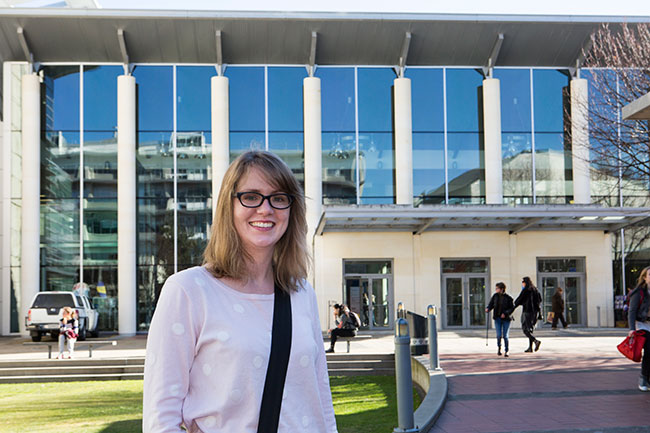 Monday, 23 April 2018
Monday, 23 April 2018
PhD student Amber Young. Photo Rewa Pene
Some patients in New Zealand may not be receiving adequate information about their newly-prescribed medicines, new University of Otago research suggests.
Responses from 119 pharmacists and 150 GPs participating in the research were analysed showing neither health professional verbally informs patients about new medicines all of the time. However, significantly more GPs (75.3 per cent) than pharmacists (43.7 per cent) reported giving verbal information all of the time.
Ongoing communication and education about medicines appear even less likely when they are prescribed for chronic conditions, the research undertaken by PhD student Amber Young from the University of Otago's School of Pharmacy, shows.
In an earlier review undertaken by Mrs Young and this latest research's co-authors Drs June Tordoff and Alesha Smith from the School of Pharmacy and Sharon Leitch from the Department of General Practice and Rural Health, it was found patients often want to know information about their prescribed medicines. However, this latest study indicates patients are often not given all of the specific information they desire.
Mrs Young says the research highlights the use of counselling aids and tools, such as a medicine information leaflet, could help healthcare professionals provide patients with the information they need.
"A medicines information leaflet, routinely handed out to all patients by both GPs and pharmacists, could ensure patients receive all the information they need to know about certain medications," Mrs Young says.
Informing patients about their medicines before they start treatment is written into professional standards for both the Medical Council of New Zealand for doctors and the Pharmacy Council of New Zealand, for pharmacists.
"The fact that many respondents indicated they do not orally communicate with patients all of the time highlights the difference between ideal practice and what can be achieved in the real world," the research paper just published in the Health Education Journal states.
Results from the 2016 survey show GPs are more likely than pharmacists to discuss many counselling points including clinical information like the purpose of the medicine and how it might help the patient's condition.
While pharmacists are more likely than GPs to advise on practical aspects like how to administer the medicine and medicine formulation. Some information may only be provided if requested by the patient.
But neither profession appear to consistently cover all of the counselling points evidence suggests patients in general want to know for both new and repeat medicines.
In particular, Mrs Young says GPs and pharmacists were more likely to discuss the benefits of the medicines than the risks, yet patients are more likely to be concerned about the risks.
The fact that GPs report more frequent verbal counselling than pharmacists for new and long-term medicines may be because GPs have a one-to-one counselling opportunity, the researchers say. Or, the fact that pharmacy income is based on the number of medications dispensed or sold rather than patient counselling, could impact on communication.
"Furthermore, lack of time is of international concern in community pharmacy practice and is often identified as a barrier to provision of services," the researchers state.
Further research will focus on investigating innovative and more automated ways that patients could receive their medicines information.
For more information, please contact:
Amber Young
University of Otago School of Pharmacy
Mob +64 27 514 0347
Email amber.young@otago.ac.nz
Liane Topham-Kindley
Senior Communications Adviser
Tel +64 3 479 9065
Mob +64 21 279 9065
A list of Otago experts available for media comment is available elsewhere on this website.
Electronic addresses (including email accounts, instant messaging services, or telephone accounts) published on this page are for the sole purpose of contact with the individuals concerned, in their capacity as officers, employees or students of the University of Otago, or their respective organisation. Publication of any such electronic address is not to be taken as consent to receive unsolicited commercial electronic messages by the address holder.